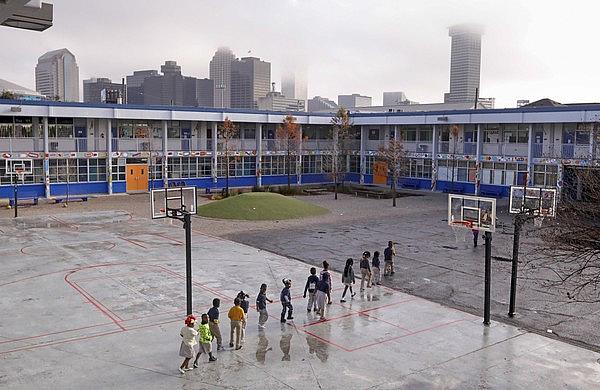New Orleans City Council urges schools to address trauma in student lives
This story was produced as part of a project for the Dennis A. Hunt Fund for Health Journalism, a program of the USC Annenberg Center for Health Journalism.
Read other stories in the series here, including:

Students walk across the campus at KIPP Central City Primary on Thursday, January 11, 2018.
The New Orleans City Council on Thursday (July 26) unanimously approved a resolution calling for the city's public and private schools to address the role of trauma in the lives of their students.
"Schools have a vital role to play in providing a stable environment including connecting students impacted by trauma to compassionate, skilled and responsive adults," the resolution reads.
Councilmember Helena Moreno, who authored the resolution, acknowledged the council's lack of control over school operations. But, she added, "we can raise awareness on certain best practices we hope to be implemented in all schools in the city of New Orleans."
"We have to face it that right now, our systems are ordinarily not helping kids who are affected by trauma, but instead actually making their trauma worse," Moreno said.
A handful of child-welfare advocates and nonprofit leaders attended Thursday's meeting to support the resolution, which urges school leaders to "adapt lessons and mental health services to address the educational needs of children who have experienced trauma."
Among those in attendance was John Brown Sr., Orleans Parish school board president, who told council members he "wholeheartedly" supported the resolution.
"I hope charter leaders will embrace this," Brown said after the meeting, adding that he would talk with fellow board members and district superintendent Henderson Lewis Jr. about next steps.
The resolution comes on the heels of the NOLA.com | The Times-Picayune series, "The Children of Central City," which followed a team of 9- and 10-year-old boys playing football at A.L. Davis Park. Through the players' stories, the series detailed how chronic exposure to violence alters a child's brain development and other systems in the body, and what – if anything – is being done to help the city's youngest residents cope with the scars of that trauma.
Part of the series explored how trauma can steal a child's focus in the classroom and cause him or her to lash out at teachers and classmates. In surveys of more than 300 students from Central City area public schools since 2016, one in five children said they had witnessed a murder, and more than half had someone close to them who was murdered, according to the Institute of Women and Ethnic Studies, a nonprofit public health organization that conducted the surveys.
Trauma is often not acknowledged as the root cause of a child's poor performance in school or disruptive behavior in class, some educators and child psychiatrists say. Instead, children are misdiagnosed with attention deficit hyperactivity disorder or they are punished with detention or suspension as a result of their behavior.
Eleven New Orleans public schools are taking part in separate initiatives to train teachers and staff to recognize the link between trauma and school performance, and to transform schools into safe spaces where traumatized students can get back on track. Similar approaches have taken root in school districts in Los Angeles, San Diego and Philadelphia, among others.
Still, efforts to introduce trauma-informed practices in New Orleans' fractured charter school network is challenged by years of zero-tolerance discipline policies that became a hallmark of some post-Katrina schools, and by a state evaluation system that ties a school's survival to standardized test scores.
[This story was originally published by NOLA.com | The Times-Picayune.]
(Photo by Brett Duke, NOLA.com | The Times-Picayune)


